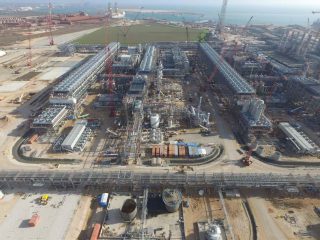Cheniere Energy engaged a group of financial institutions to assist in the structuring and arranging of up to $6.4 billion of credit facilities for its Corpus Christi LNG project.
Cheniere’s unit, Corpus Christi Holdings will amend and upsize its existing approximately $4.6 billion of credit facilities to increase the available commitments.
The amended credit facilities will be used to fund a portion of the costs of developing, constructing, and placing into service three liquefaction trains and related facilities of the Corpus Christi liquefaction project, and the related pipeline being developed near Corpus Christi, Texas and for related business purposes.
The financial institutions selected as lead arrangers include ABN Amro, Bank of America, Bank of China, The Bank of Nova Scotia, Banco Bilbao Vizcaya Argentaria, China Merchants Bank, Citibank, Commonwealth Bank of Australia, Credit Suisse, DBS Bank, Goldman Sachs, HSBC, National Association, Industrial and Commercial Bank of China, ING Capital, Intesa Sanpaolo, JPMorgan Chase Bank, Lloyds Bank plc, Mizuho Bank, Morgan Stanley Senior Funding, MUFG Bank, RBC Capital Markets, Santander Bank, Société Générale, Standard Chartered Bank, Sumitomo Mitsui Banking Corporation and others.
Cheniere expects to close the amended credit facilities, proceed with a final investment decision for train 3 of the Corpus Christi liquefaction project, and issue a notice to proceed to Bechtel for train 3 in the first half of 2018.
The liquefaction project was initially designed for five trains with expected aggregate nominal production capacity of up to 22.5 million tonnes per annum (mtpa) of LNG.
However, following the contract amendment in December with Bechtel, which will see the Bechtel develop up to seven midscale liquefaction trains adjacent to the Corpus Christi liquefaction project, each with an expected nominal production capacity of approximately 1.4 mtpa of LNG in the project’s second stage.
The total expected nominal production capacity of the seven midscale trains is approximately 9.5 mtpa, lifting the project’s total capacity to 23 mtpa.


